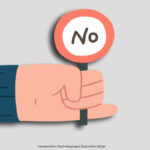
Social life can be fun and energizing. After all, we are social and sociable beings. However, sometimes the mere thought of a family dinner or a hangout with friends is likely to exhaust you. Laughing, talking, and having a fun time with the people you love is supposed to be positive and desirable, but sometimes it’s just draining.
Why are there times when you feel like sharing with other people and days when you just want to be alone? The answer lies in your social battery.
What is social battery?
Social battery is an expression that has become popular on the networks to refer to the amount of energy that each person has to socialize. It is a metaphor to indicate the energy, time and effort that each person dedicates to others.
Obviously, the size of the social battery and the activities that drain or recharge it vary from person to person. For example, extraverts tend to have a larger social battery, meaning they can socialize a lot more without feeling burned out. In contrast, introverts have a smaller social battery that drains relatively quickly in large groups.
Although the size of the social battery varies, a study conducted at the University of Helsinki suggests that most of us begin to feel fatigued from social interactions after about three hours. And relating to others involves talking, listening, feeling empathy, capturing and decoding social signals… so it can be a mentally exhausting process.
What drains our social battery?
The factors that drain the social battery vary from one person to another and even from the moment in their life they are going through. However, some situations tend to have a greater potential to drain that battery more than others because they are more demanding or become an obstacle for relationships to flow.
- Personal characteristics. Personality traits such as extraversion/introversion determine the size of the social battery and how quickly it discharges. While extraverts feel energized when socializing and enjoy being the life of the party, highly sensitive people or introverts feel very drained after long social events and find more stimulating deep, more intimate conversations or even loneliness.
- The person you socialize with. Yes, there are exhausting people who drain our energy. Either because they talk a lot, they transmit great tension to us or simply because they have a communication style that is too different from ours, forcing us to make extra mental and emotional effort to keep up with the pace of the conversation. People who always complain, for example, tend to be particularly exhausting.
- Type of interaction. The quality of the interactions can make them more or less draining. Chatting with strangers is often more tiring than spending time with close friends or family, but spending time with an unfriendly friend will also make us more tired than being with a group of warm friends. As a general rule, interactions that validate us and make us feel comfortable are less draining and can even be energizing. On the other hand, interactions in which we feel misunderstood or judged tend to be emotionally draining since they require us to be continually on alert to defend ourselves from the next “low blow.”
- Group size. Larger groups involve more interactions, make more noise, and generate more complex social dynamics. To place ourselves in a group we need to deploy more cognitive and emotional resources, which is why they tend to be more exhausting than an individual meeting or one with just a few people.
- Duration of the meeting. Even for extraverts, socializing for long periods of time drains energy and provides fewer opportunities to recharge. For example, we may enjoy attending two short events over the course of a week, but we might find a week-long event exhausting. For that same reason, we can endure a half-hour work meeting better than a three-hour one.
- Personal circumstances. The social battery also depends on factors unrelated to socialization itself, such as stress, physical fatigue, sadness, anxiety… Our mood, as well as our physical disposition, determine the amount of energy we have available to spend on relations. When we have the flu, feel physically unwell, or are very tense, we have less energy to interact with others.
However, there are many other factors that can drain your social battery. Being constantly connected to social media, for example, will reduce your ability to interact in the real world. Not having enough time for yourself, following an overloaded schedule, or even a lack of authenticity in relationships can leave your social energy at a minimum.
The 8 signs that indicate that your social battery is at a minimum
As with the phone, it is better to avoid running out of battery on an emotional level because that is equivalent to assuming a very vulnerable position when faced with stress. And you must be careful because, if you don’t recharge it daily, it will end up running out completely (and no, you can’t change it like you would with your cell phone).
Research carried out at the University of Bern revealed that we tend to feel more exhausted at night after experiencing stressful social situations at work. However, this fatigue has a cumulative nature. On Friday, at the end of the work week, participants felt more exhausted after experiencing elevated levels of social stress.
Luckily, there are some signs that your social battery is running low:
- Fatigue. Feeling of physical and mental fatigue, even if you have not done strenuous activities.
- Irritability. You get easily upset or frustrated by inconsequential things that normally wouldn’t affect you as much.
- Social avoidance. You avoid commitments or social interactions because you experience a deep need to be alone.
- Impatience. You have become less tolerant of delays, interruptions, small failures or the behaviors of others.
- Apathy. The social activities that you normally enjoyed are no longer satisfying and just thinking about them makes you infinitely lazy.
- Reduced empathy. You find it more difficult to put yourself in other people’s shoes or understand their points of view, which often leads to arguments and conflict.
- Humor changes. You experience mood swings, usually increased anxiety or a feeling of sadness and hopelessness.
- Feeling of saturation. You continually feel overwhelmed by social obligations or responsibilities, even minor and informal ones, such as an outing with friends.
5 strategies to preserve your social energy
Your social energy is a valuable resource, so you’d better spend it wisely and, above all, don’t get to the point where you feel emotionally and physically drained. How to achieve it?
- Take note of what drains you. Understanding what situations and factors tend to drain your social battery can help you minimize their impact. For example, if large events drain you, you can try to avoid them by choosing smaller formats that you feel more comfortable with.
- Plan time just for you. Discover what activities help you recharge your energy, whether reading, listening to music, taking a walk in nature or devoting yourself to dolce far niente . And reserve time in your schedule for them. The ideal is that you spend at least half an hour a day in solitude so that you can connect with yourself.
- Set limits and learn to say “no.” Start by recognizing your limits so you don’t exceed them. And if you’re exhausted, don’t feel guilty for putting your needs first and rejecting certain commitments. You have the right to have time for yourself and to establish healthy boundaries that allow you to take care of yourself and preserve your energy.
- Be more selective. Your time and energy are limited, so spend them wisely. Instead of quantity, focus on fostering quality social interactions. Make better choices about the events you attend, the commitments you make, and the people you spend your time with. This way you can preserve your social battery for the most valuable and significant moments.
- Disconnect from technology. Face-to-face interactions aren’t the only ones that drain your social battery. Social networks and infoxication also consume a large amount of resources, making you constantly aware of what is happening. So if you really want to relax and recharge your batteries, put away your devices and unplug until you feel refreshed. That rest will also be very beneficial for your mental health.
Finally, remember that although the social battery is a metaphorical figure to explain a complex phenomenon, its psychological and physical consequences are very real. Everyone has limits, which means it’s normal for us to not always be available. You don’t have to reach everything, sometimes you need yourself.
References:
Elfering, A. et. Al. (2021) Battery Discharge from Monday to Friday: Background Social Stress at Work is Associated with more Rapid Accumulation of Fatigue. Sleep Vigilance; 5: 49–60.
Leikas, S. & Ilmarinen, V. (2016) Happy Now, Tired Later? Extroverted and Conscientious Behavior Are Related to Immediate Mood Gains, but to Later Fatigue. Journal of Personality; 85(5): 603-615.




Leave a Reply